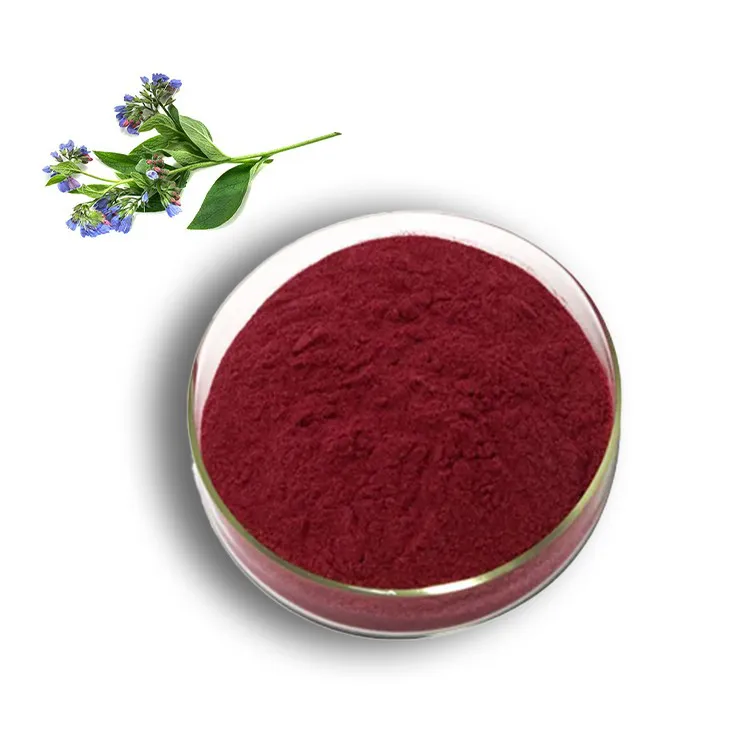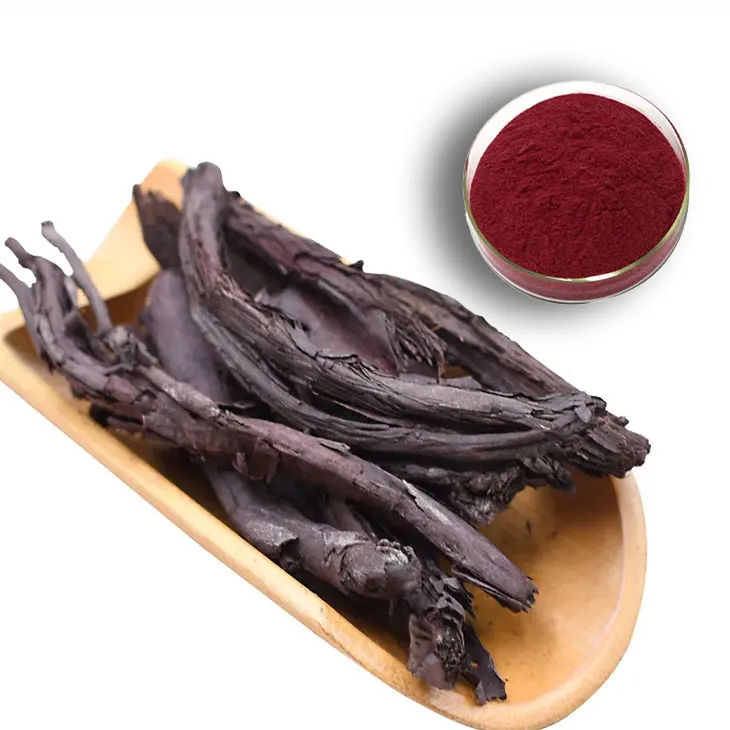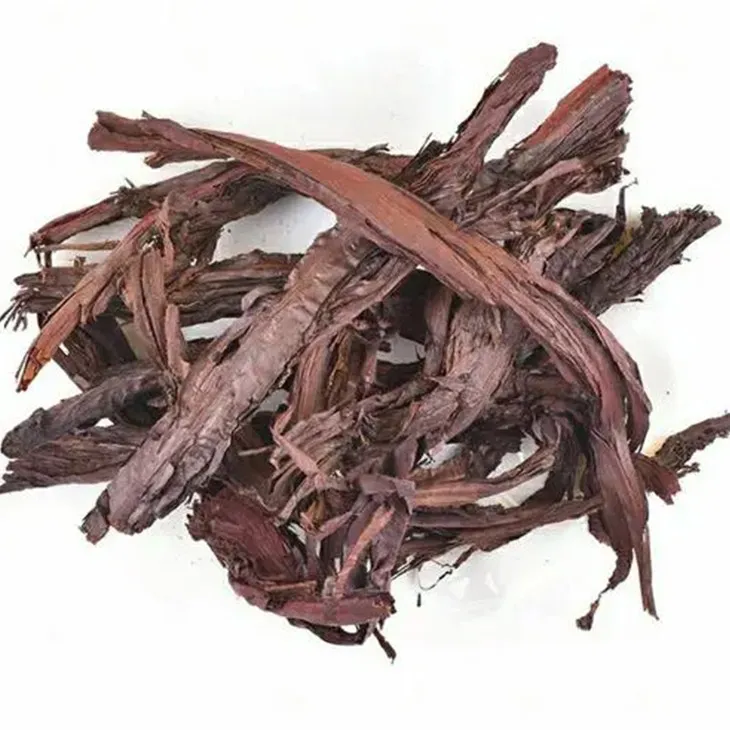- 0086-571-85302990
- sales@greenskybio.com
Shikonin: What Are Its Benefits and How to Take It?
2024-11-12

1. Introduction
Shikonin is a natural compound that has been the focus of much research in recent years. It is derived from the roots of the plant Lithospermum erythrorhizon, also known as purple gromwell. This compound has shown a wide range of potential health benefits, making it an interesting subject for both scientific study and potential therapeutic applications.

2. Benefits of Shikonin
2.1 Skin Health
Wound Healing: Shikonin has been shown to play a significant role in promoting wound healing. It stimulates the migration and proliferation of fibroblasts, which are cells responsible for synthesizing the extracellular matrix in connective tissue. This helps in the formation of new tissue during the wound - healing process. For example, in experimental studies, when shikonin was applied to wounds, it was observed that the rate of wound closure was significantly faster compared to control groups.
Anti - Inflammatory Effects on the Skin: Inflammation is a common factor in many skin disorders. Shikonin has anti - inflammatory properties that can help reduce redness, swelling, and pain associated with skin inflammation. It inhibits the production of pro - inflammatory cytokines, which are signaling molecules that promote inflammation. This makes it potentially useful in treating conditions such as eczema, psoriasis, and dermatitis.
2.2 Antimicrobial Activity
Shikonin exhibits strong antimicrobial effects against a variety of microorganisms.
- Bacteria: It has been shown to be effective against both gram - positive and gram - negative bacteria. For instance, it can inhibit the growth of Staphylococcus aureus, a common pathogen responsible for skin infections, as well as Escherichia coli, which can cause urinary tract infections. The mechanism of action against bacteria involves disrupting the bacterial cell membrane and interfering with essential cellular processes.
- Fungi: Shikonin also has antifungal properties. It can combat fungal infections caused by organisms such as Candida albicans. By targeting specific components in the fungal cell wall or membrane, shikonin can prevent the growth and spread of fungi.
- Viruses: Some research suggests that shikonin may have antiviral activity as well. Although the exact mechanisms are still being investigated, it is believed that shikonin can interfere with viral entry into host cells or viral replication processes.
2.3 Potential Anti - Cancer Properties
Preliminary research has indicated that shikonin may have anti - cancer potential.
- Cell Cycle Arrest: Shikonin can induce cell cycle arrest in cancer cells. It targets specific regulatory proteins involved in the cell cycle, such as cyclins and cyclin - dependent kinases. By disrupting the normal cell cycle progression, shikonin can prevent cancer cells from dividing and multiplying uncontrollably.
- Apoptosis Induction: Another way shikonin may fight cancer is by inducing apoptosis, or programmed cell death, in cancer cells. It activates specific intracellular signaling pathways that lead to the self - destruction of cancer cells while leaving normal cells relatively unaffected.
- Anti - Angiogenesis: Cancer cells require a blood supply to grow and metastasize. Shikonin has been shown to have anti - angiogenesis properties, which means it can inhibit the formation of new blood vessels that supply tumors. This can starve cancer cells of the nutrients and oxygen they need to survive and proliferate.

3. How to Take Shikonin
3.1 Oral Administration
Shikonin can be taken orally in the form of capsules or tablets. However, when taking shikonin orally, it is important to follow the recommended dosage. The dosage may vary depending on factors such as the intended use (e.g., for general health maintenance or for treating a specific condition), the individual's age, weight, and overall health status.
It is also crucial to ensure that the shikonin product is obtained from a reliable source. Poor - quality or unregulated products may not contain the correct amount of shikonin or may be contaminated, which can pose risks to health.
3.2 Topical Application
For skin - related benefits, shikonin can be applied topically in the form of creams, ointments, or gels. When applying topically, it is necessary to clean the affected area thoroughly before application. A small amount of the product should be applied evenly to the skin and gently rubbed in until absorbed.
It is important to note that some individuals may experience skin irritation or allergic reactions when using shikonin - based topical products. If any signs of redness, itching, or swelling occur, the use of the product should be discontinued immediately and medical advice sought.

4. Precautions and Side Effects
While shikonin has potential health benefits, it is not without precautions and possible side effects.
- Allergic Reactions: Some people may be allergic to shikonin. Allergic reactions can range from mild skin rashes to more severe symptoms such as difficulty breathing or swelling of the face, lips, or tongue. If an allergic reaction occurs, immediate medical attention should be sought.
- Gastrointestinal Disturbances: When taken orally, shikonin may cause gastrointestinal side effects in some individuals. These can include nausea, vomiting, diarrhea, or abdominal pain. If these symptoms persist or are severe, it is advisable to stop taking shikonin and consult a healthcare provider.
- Interactions with Medications: Shikonin may interact with certain medications. For example, it may affect the absorption or metabolism of drugs taken for other medical conditions. It is important to inform your doctor if you are taking shikonin, especially if you are also on other medications.
5. Conclusion
Shikonin is a compound with a variety of potential benefits, including those related to skin health, antimicrobial activity, and possible anti - cancer properties. However, when considering taking shikonin, it is essential to be aware of the proper methods of intake, potential side effects, and any precautions. Consulting a healthcare professional before using shikonin - based products is highly recommended to ensure safety and maximize the potential benefits.
FAQ:
What is shikonin?
Shikonin is a natural compound that is often derived from plants. It has been the subject of research due to its various potential properties.
How does shikonin promote wound healing?
Shikonin may promote wound healing through several mechanisms. It could potentially stimulate cell growth and repair processes in the skin. It might also have anti - inflammatory properties that help in reducing swelling and irritation around the wound, which in turn aids in the overall healing process.
What are the antimicrobial effects of shikonin?
Shikonin has the ability to combat various microorganisms. It can interfere with the growth and reproduction of bacteria, fungi, and other microbes. This may be due to its ability to disrupt the cell membranes or metabolic processes of these microorganisms, thereby inhibiting their growth and preventing infections.
What are the possible side - effects of taking shikonin?
Some possible side - effects of taking shikonin may include allergic reactions in some individuals. It could also potentially interact with other medications or supplements, causing unforeseen effects. However, more research is needed to fully understand all possible side - effects.
Can anyone take shikonin?
No, not everyone can take shikonin. Pregnant or breastfeeding women should be especially cautious as its safety in these situations has not been fully established. People with pre - existing medical conditions or those taking other medications should also consult a healthcare professional before taking shikonin.
Related literature
- The Pharmacological Properties of Shikonin: A Review"
- "Shikonin: From Traditional Medicine to Modern Therapeutics"
- "The Role of Shikonin in Skin Health and Disease"
- ▶ Hesperidin
- ▶ Citrus Bioflavonoids
- ▶ Plant Extract
- ▶ lycopene
- ▶ Diosmin
- ▶ Grape seed extract
- ▶ Sea buckthorn Juice Powder
- ▶ Fruit Juice Powder
- ▶ Hops Extract
- ▶ Artichoke Extract
- ▶ Mushroom extract
- ▶ Astaxanthin
- ▶ Green Tea Extract
- ▶ Curcumin
- ▶ Horse Chestnut Extract
- ▶ Other Product
- ▶ Boswellia Serrata Extract
- ▶ Resveratrol
- ▶ Marigold Extract
- ▶ Grape Leaf Extract
- ▶ New Product
- ▶ Aminolevulinic acid
- ▶ Cranberry Extract
- ▶ Red Yeast Rice
- ▶ Red Wine Extract
-
Uridine-5'-monophosphate Disodium salt
2024-11-12
-
Coix Seed Extract
2024-11-12
-
Maca Extract
2024-11-12
-
Alisma Extract
2024-11-12
-
Bitter Melon Extract
2024-11-12
-
Passionflower Extract
2024-11-12
-
Oyster Mushroom Extract Powder
2024-11-12
-
Apricot Powder
2024-11-12
-
Bayberry Extract
2024-11-12
-
Hawthorn powder
2024-11-12





















